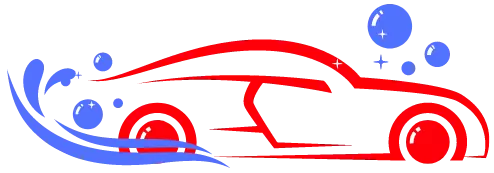The car usually shakes or jerks when driving due to worn tires or unbalanced wheels. But, if your car jerking when braking, it’s a clear sign of a faulty braking system. It can also happen due to out-of-balance brake rotors, dirty brake pads, warped rotors, or even poor driving skills.
If you feel jerking, pulsating, or chugging when braking, accelerating, or slowing down, diagnose and inspect the car by a qualified mechanic.
Article Summary
Car Jerking when Braking- Most Possible Causes
When you brake, it shifts the whole weight from the car’s back to the front. The car’s back rises on the back suspension and the front drop on the front suspension. It can cause your car to jerk forward which is a completely normal thing.
However, there can be a few internal issues that can cause your car to jerk when braking. The most frequent reasons are severely worn brake pads, faulty braking systems, seized car iron discs, or poor driving skills.
1. Poor Driving Skill
If your vehicle jerks forward when braking, you may have a problem with the way you are breaking. If your press hard on the accelerator pedal or brake unsmoothly and inappropriately, your car can jerk forward. If so, you should improve your driving skill to make the ride smoother.

2. Weight Shifting Problem
If your car has an issue like a suspension problem that lets its weight shift incorrectly, it can cause the car to jerk when braking. When you slow down the car and shift the driving gear to lower gear, your car can make a bit of jerking.
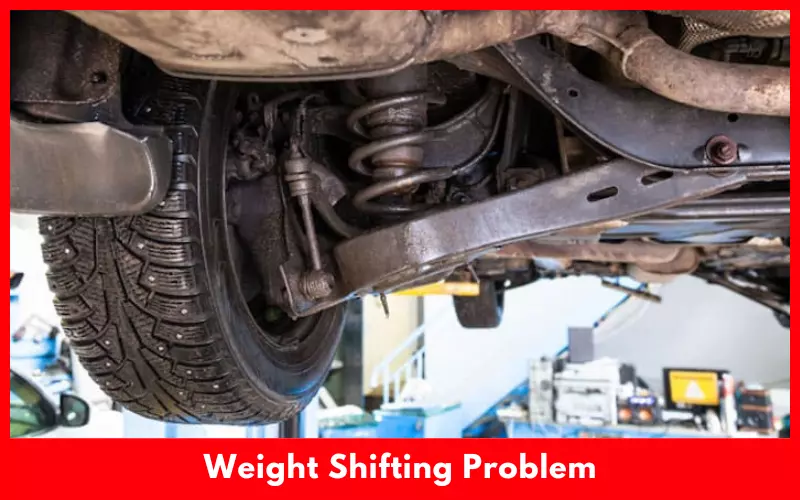
But if the jerking is more than noticeable, your car may have a serious weight-shifting problem. The weight-shifting problem may also occur if your car’s engine mount gets damaged. If so, the engine can sling forward when you brake hard or come to a complete stop.
3. Out-of-Balance Brake Rotors
Cars with out-of-balance brake rotors can cause vibrate violently or jerk to stop. The rotors are placed under the brake pad and get damaged due to accumulating dirt and debris.
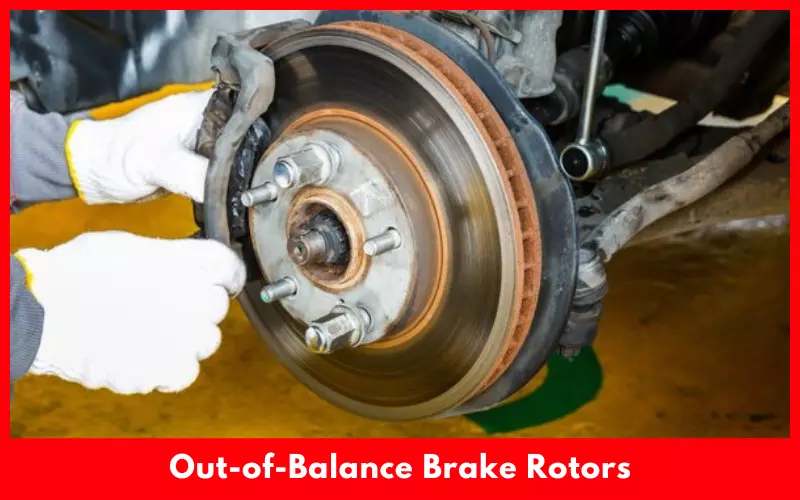
4. Worn Out Tires
If your car’s tire is worn out, it’ll make the wheel unbalanced. Hence your car’s steering wheel may start to wobble. If you feel the car jerking noticeably particularly at high speed, the worn tire is responsible.
5. Dirty Brake Pads
If your car’s brake pad is filled with debris or worn out, it can affect the area under the brake pad. Hence your vehicle can pulsate while braking. If a brake pad wears out, it won’t be able to bring wheels and axle to a halt which can make a jerking or jumping sensation.
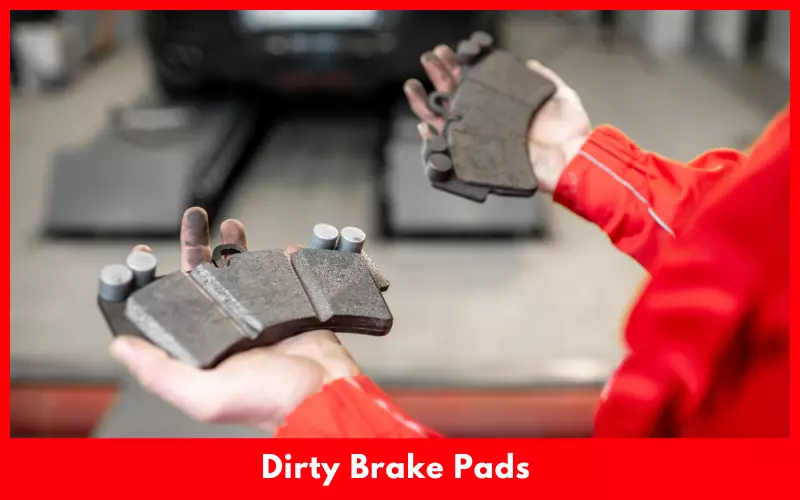
You have to inspect the brake pad regularly to avoid causing wear out and have to replace it if already gets damaged. The sign of a worn-out brake bad includes a lazy braking process, high-pitched squealing noise, and grinding noise when braking.
6. Brake Calipers
The brake calipers push the brake pads against the rotor. If it can’t push the brake pad correctly, the steering wheel may start vibrating. The brake calipers can fail due to accumulating dust or causing wear and corrosion.
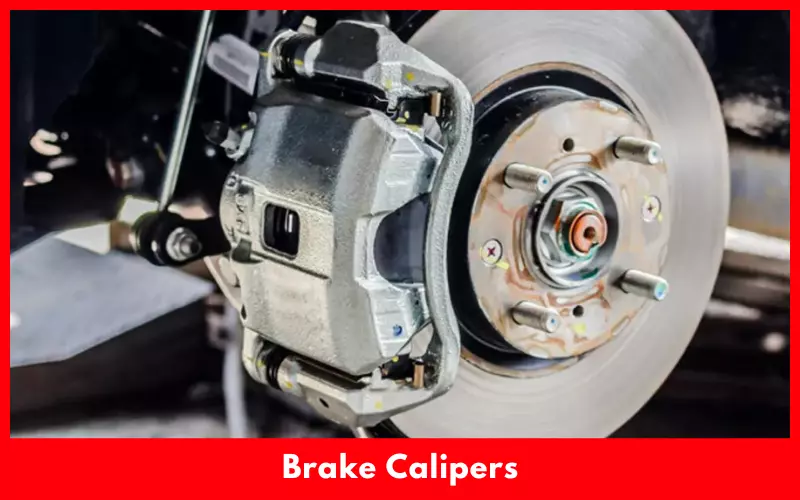
The brake caliper may also become sticky or leak due to the piston inside the caliper. The caliper’s rubber ring may wear out and let the brake fluid leak into the sides. It can reduce the effectiveness of the piston and wear out the brake pad unevenly which can contribute to car jerking when braking.
7. Binding Drum Brake
Your car’s rear brakes or drum brakes may cause jerking if get binding due to weak springs or binding wear wheel brake cylinders. If it happens, the brakes won’t return quickly enough when you apply it and make some jerking. To fix the problem, you have to inspect the brake by a qualified mechanic as they can determine the cause of the binding brake and fix it.
8. Warped Rotors
The brake rotors are clamped down by the brake pad when you try to stop the wheel and the car. But these rotors can warped or wear out due to the extreme heat that the brake generates. Warped or uneven brake rotors can cause the rough application of the brake and end up making the car jerk when braking.
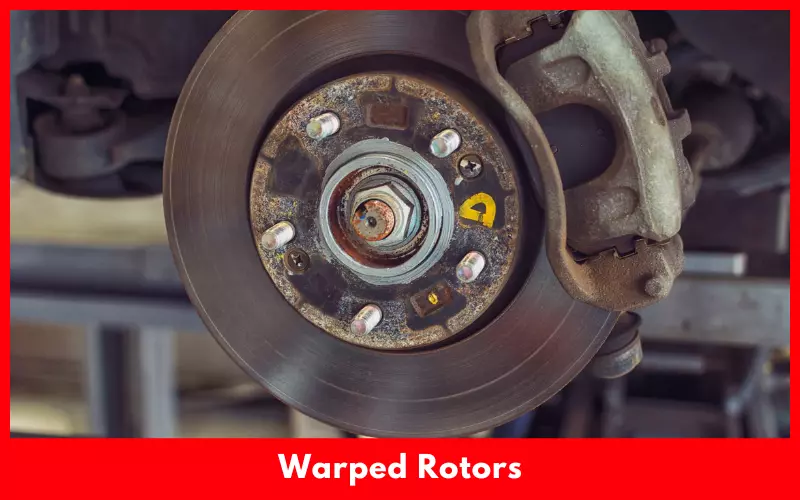
Why is my Car Jerking when Releasing the Brake?
If your car jerks when releasing the brake, it can be the result of a DSG (Direct Shift Gearbox) transmission or manual transmission. There is a direct connection between the wheels and engine in manual and DSG transmission.
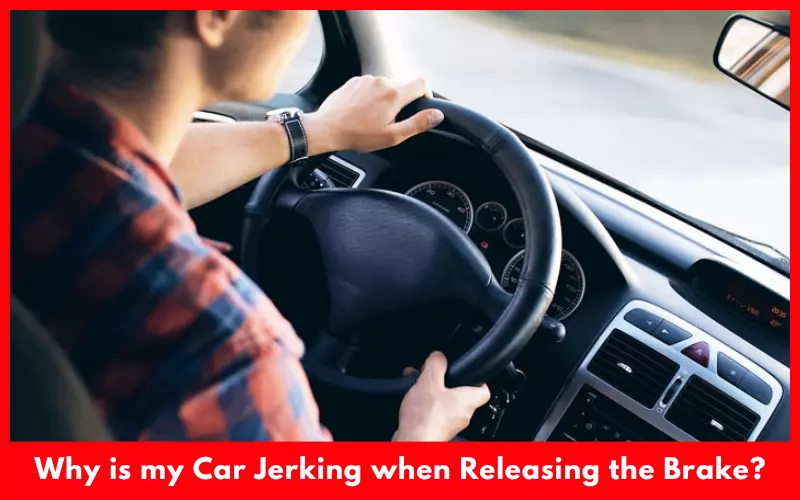
So you can feel the onset of engine braking particularly at higher RPMs. Typical automatic transmissions don’t have such a direct connection and the torque converter absorbs the energy.
Your car can also jerk due to the full-functional clutches and good biting surface. Though a worn-out clutch makes fewer jerks, it can cause lots of shuddering on accelerating. The clutches can wear out sooner due to releasing the brake without getting on the gas afterward.
To avoid this problem, hold the brake pedal with firm pressure when come to a complete stop especially when driving with DSG. This’ll inform the car’s computer that you are fully at a stop and won’t try to engage the half clutch. While accelerating, leave the brake and get on the gas immediately. This’ll boost your DSGs longevity.
How to Avoid Car Jerking when Braking?
If your car jerks when braking due to a lack of driving skill instead of any internal issue, you can follow some tricks to avoid jerking.
If you drive the car in a rough manner like depress the brake suddenly or accelerate excessively, it can cause the brake parts to wear out. So drive the car smoothly and inspect the vehicle regularly by an expert mechanic.
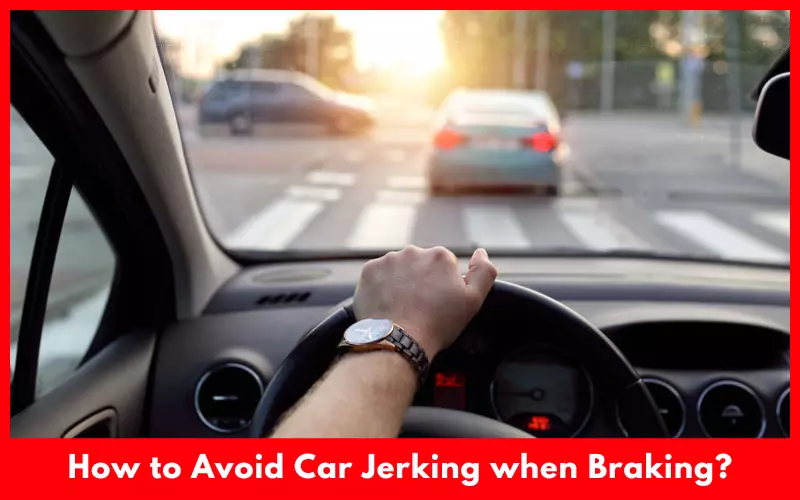
One important thing to remember is that many cars have three pedals and the right one makes the vehicle go faster. The middle one makes the car slow down and the left one is the clutch pedal. If your car jerks forward and speed up when you try to brake, use the middle pedal instead.
What to Fix a Car that Jerks when Braking?
Since your car can jerk when braking due to lots of reasons, you have the work on each possibility to fix the problem.
The tires are the easiest component to fix and start your inspection by checking the pressure. To maintain the best condition, tires need routine wheel alignments around every 6000 miles which can cost about $50 to $150. Make sure your car’s tires don’t have any wear out parts. If the tires wear out badly, change them.
But if your vehicle is jerking due to worn brake pads or rotors, bring the car to the service center to replace them. It may cost around $150 to $300 to replace the brake pads per axle.
Another mostly related component is suspension. The suspension has lots of components including CV joints, axles that you should inspect when diagnosing the suspension. since lots of parts are related, your best action will be to take the car to the nearest auto repair shop so the mechanic can identify and fix the exact issue.
FAQs
Why is the car chugging when braking?
Your car can chug when braking or vibrate rapidly due to warped or out-of-balance brake rotors. If the rotor area under the brake pad collects lots of dirt and debris, it can also cause your vehicle to pulsate when braking.
Why does my car jerk when I brake and accelerate?
Your vehicle can jerk when applying brakes and accelerate due to plenty of reasons including faulty transmission, damaged brake system, or various engine issues. The worn-out brake can jerk your car when braking while bad transmission can jolt the vehicle when shifting gears.
Why Car pulsates when braking?
If you experience the car pulsating when braking, it can be the result of the defective rotor or brake drum. A warped rotor or out-of-round drum can cause noticeable pulsing after applying the brake pedal. To fix the problem, you may need to remove the axle’s wheel, brake caliper from the rotors, brake pads, and brake rotors. Then lubricate the rotors and re-install all the parts.
Final Words
If your car jerking when braking inspect all the possible causes we’ve discussed above. If you find nothing wrong with the vehicle, it’s your rough driving method that causes the issue.
Though experiencing a little bit of jerking when braking is common, if you feel uncomfortable, bring the car to the service center. An expert mechanic will fix the underlying issue or suggest you the way to handle your particular car so you don’t feel any jerking when braking.
